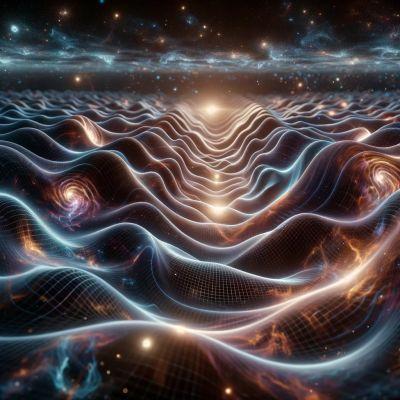
The cosmos has always been a source of mystery and fascination, prompting scientists to delve into its depths to uncover the secrets of our existence. One of the most groundbreaking ideas in recent times comes from a paper by John Ellis et al., titled "Do we owe our existence to gravitational waves?" This article aims to summarize the essence of their research, shedding light on the pivotal role that gravitational waves may play in the very fabric of our being and the universe at large.
Introduction to Gravitational Waves
Gravitational waves, ripples in the fabric of spacetime, were first predicted by Albert Einstein's theory of general relativity. It wasn't until a century later that technological advancements allowed for their detection, marking a monumental achievement in astrophysics. These waves are generated by catastrophic events in the cosmos, such as the collision of black holes or neutron stars, providing a new lens through which to observe the universe.
John Ellis et al.'s Groundbreaking Paper
In their visionary work, Ellis and his colleagues propose a captivating hypothesis: gravitational waves could have played a significant role in the early universe that might affect the development of galaxies, stars, and even life itself. The paper meticulously outlines the theoretical framework, methodologies, and findings that support this hypothesis, alongside the potential implications it holds for cosmology and astrophysics.
The Role of Gravitational Waves in the Universe
The paper posits that the tumultuous conditions of the early universe, influenced by gravitational waves, could have led to variations in density that eventually resulted in the formation of galaxies and other celestial bodies. This perspective invites us to reconsider our understanding of cosmic evolution and the factors that contributed to the emergence of life-sustaining environments like Earth.
Debating the Hypothesis
Ellis et al.'s hypothesis has sparked a vibrant debate within the scientific community, attracting both support and skepticism. Critics argue that the current evidence remains speculative, while supporters see it as a promising avenue for future research. This discussion underscores the dynamic nature of scientific inquiry, where every hypothesis serves as a stepping stone toward deeper understanding.
Future Directions in Research
The paper by John Ellis and his team opens up new horizons for research, encouraging scientists to explore the influence of gravitational waves on cosmic evolution with fresh eyes. Technological advancements in the detection of gravitational waves will undoubtedly play a crucial role in validating or challenging the proposed hypothesis, potentially leading to revolutionary insights into our cosmic origins.
Conclusion
"Do we owe our existence to gravitational waves?" by John Ellis et al. presents a fascinating perspective on the role of gravitational waves in shaping the universe and, by extension, our very existence. While the debate continues, the paper serves as a testament to the endless curiosity that drives humanity to explore the unknown, reminding us of the intricate connections that bind us to the cosmos.
Source: Cornell University
